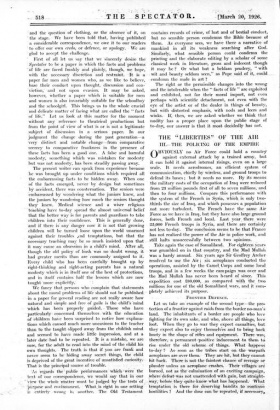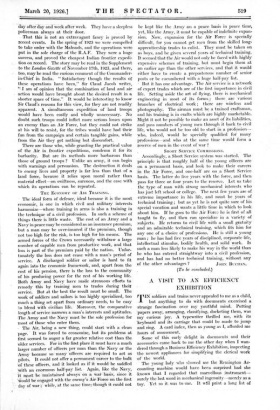THE "LIBERTIES" *OF THE AIR
III.—THE POLICING OF THE EMPIRE OBVIOUSLY no Air Force could hold a country against external attack by a trained army, but it can hold it against internal risings, even on a large scale. It needs aerodromes, an • efficient system of communication, chiefly by wireless, and ground troops to defend' its bases ; but it needs no more. By its- means the military costs of the occupation of Iraq were reduced from 23 million pounds first of all to seven millions;- and then to four millions. Compare this performance with _the system of , the French. in Syria, which, is_ only two7 :thirds the size of Iraqi and which possesses a. population ,not more turbulent. The French have the same Air Force as we have in Iraq, but they have also large ground forces, both French , and local. Last year there, were -25,000 French troops in. Syria, and there are certainly not less to-day. The conclusion seems to be that France has not realized the, power of the Air in police work, and still halts unsuccessfully between two opinions.
Take again the case of Somaliland., For eighteen years war grumbled on in that country, and the Mad Mullah was a hardy annual. .. Six years ago Sir Geoffrey Archer resolved to use the Air ; ,six aeroplanes conducted the operations, assisted by the Camel, Corps and some Jocal :troops, and in a few ,weeks the campaign .was over and the Mad Mullah has never been heard of since. This expedition. cost 40,000,, as compared with the two millions for one of the old Somaliland_ wars, and it .com- pletely achieved its purpose. _ . • - FRONTIER DEFENCE.- Let us take an example-of the second-type--the -pro.
• tection of a frontier against raids from the border no-man's land. The inhabitants of a border are people who love fighting-for its own sake; and. who, aboVe all things; love loot. When they go to -war they expect casualtiesi. but they expect also to • enjoy themselVes and to bring back booty in the shape -Of rifles and equipment. There -was; therefore; a permanerib-positive inducement -to them t6 rise under the old..Scheine:.-Of things: What happens to-day-?- :As- soon as• the 'tribes start on -the • warpath aeroplanes are over them: They are hit; but they-cannot hit back. -There-is:not- the- faintest chance of revenge or plunder unless an -aeroplane crashes. - Their villages are burned, not as the culmination of an exciting campaign, *h_ ere: defeat-Was not unattended with. gain, but straight...
• Way; beforo-they- quite4mow what has happened.- What temptation is there for deserving bandits to 'continue hostilities f -And the dose can be repeated, if necessary, day afterrcray and week after week. They have a sleepless policeman always at their door.
That this is not an extravagant fancy is proved by recent events. In the spring of 1925 we were compelled to take order with the Mahsuds, and the operations were put in the sole charge of the R.A.F. They were a huge success, and proved the cheapest Indian frontier expedi7 tion on record. The story may be read in the Supplement to the London Gazette of November 17th, 1925, and there, - too, may be read the curious comment of the Commander- in-Chief in India. " Satisfactory though the results of these operations have been," Sir Claud Jacob writes, "! I am of opinion that the combination of land and air action would have brought about the desired result in a shorter space of time." It would be interesting to know Sir Claud's reasons for this view, for they are not readily. apparent. A simultaneous expedition of land troops would have been costly and wholly unnecessary. No doubt such troops could inflict more serious losses upon an enemy than an Air Force, but they. could not strike at his will to resist, for the tribes would have had their fun from the campaign and certain tangible gains, while from the Air they get nothing but discomfort.
There are those who, while granting the practical value of the Air in frontier expeditions, condemn it for its barbarity. But arc its methods more barbarous than those of ground troops ? Unlike an army, it can begin with warnings and persuasion. The destruction it deals to enemy lives and property is, far less than that of a land force, because it relies upon moral rather than material effect—on swiftness, sureness, and the ease with which its operations can be repeated.
THE ECONOMY OF AIR TRAINING.
The ideal form of defence, ideal because it is the most economic, is one in which civil and military interests harmonize—where training in arms is also a training in the technique of a civil profession. In such a scheme of things there is little waste. The cost of an Army and a Navy in peace may be considered as an insurance premium, but a man may be over-insured if the premium, though not too high for the risk, is too high for his means. The armed forces of the Crown necessarily withdraw a large number of capable men from productive work, and that loss is part of the premium paid by the nation. Unfor.. tunately the loss does not cease with a man's period of service. A discharged soldier or 'sailor is hard to fit again into the economic framework, and, apart from the cost of his pension, there is the loss to the community of his producing power for the rest of his working life. Both Army and Navy have made strenuous efforts to remedy this by training men to trades during their service. But at the best the result must be small. The work of soldiers and sailors is too highly specialized, too much a thing set apart from ordinary needs, to be easy to blend with civilian life. Moreover, the comparative length of service narrows a man's interests and aptitudes. -The Army' and the Navy must be the sole profession for most of- those who enter them. .
• The Air, being a new thing, could start with a clean page. It was forced to economize, but its- problems at first seemed to augur a far greater relative cost than the 'older services. For in the first place it must have a much larger number of officers per man than the Navy or the Army because so- many -officers are required to act as pilots. It could not offer a permanent career to the bulk of thesc officers, and it looked as if it would' be saddled with an enormous half-pay list. • Again, like the Navy, it must be maintained- always on a war -basis, since it 4ould be engaged- with the enemy's- Air Force on the-first day of war ; while, at the same time; though it- could not be kept like the Army on a peace basis in peace time, yet, like the Army, it must be capable of indefinite expan- sion. Now, expansion for- the Air Force is specially difficult, for you cannot get men from the skilled long-- apprenticeship trades to enlist.. They must be taken on as boys, and be given several years of technical training. It seemed that the Air would not only be faced with highly expensive schemes of training, but must begin them at an earlier age than the other services, and that it would either have to create a. preposterous number of senior posts or be encumbered with a huge half-pay list..
- But it has one advantage. The Air service is a network of expert trades which arc of the first importance in civil life. Setting aside the art of flying, there is mechanical engineering in most of . its forms s; there. are various branches of electrical work ; there arc wireless and photography. The airman must be a trained craftsman, and his training is in crafts which are highly marketable. Might it not be possible to make an asset of its liabilities, and pass numbers of young men through it back to civil life, who would not be too old to start in a profession— who, indeed, would be specially qualified for many professions—and who at the same time would form a reserve of men in the event of war ?
• : SHORT SERVICE COMMISSIONS.
Accordingly, a Short Service system was started. The principle is that roughly. half of the .young officers are on a permanent basis, and .look to make . their careers in the Air Force,. and. one-half arc on .a Short Service basis. The latter do five years with the. force, and then pass for three or .four years to the reserve. Let us take the type of: man with strong_ mechanical interests who has just left school or college. The next few years are of extreme importance in his life, and must be years of technical training ; but as yet he is not quite sure of his special vocation and wants a little time in which to look about him. If he goes to the Air Forc3 he is first of all taught to fly, and then can specialize in a variety of subjects. He returns to civil life with a small gratuity and an admirable technical training, which fits him for any one of a choice of professions. He is still a young man ; he has had five years of disciplined, corporate life, intellectual stimulus, bodily health, and in work. Is such a man less likely to make his way in the world, than he who has entered straightway into a civil profession, and has had no better technical training, without any of the other advantages ? . JOHN BUCHAN.
(To be concluded.)



























































 Previous page
Previous page